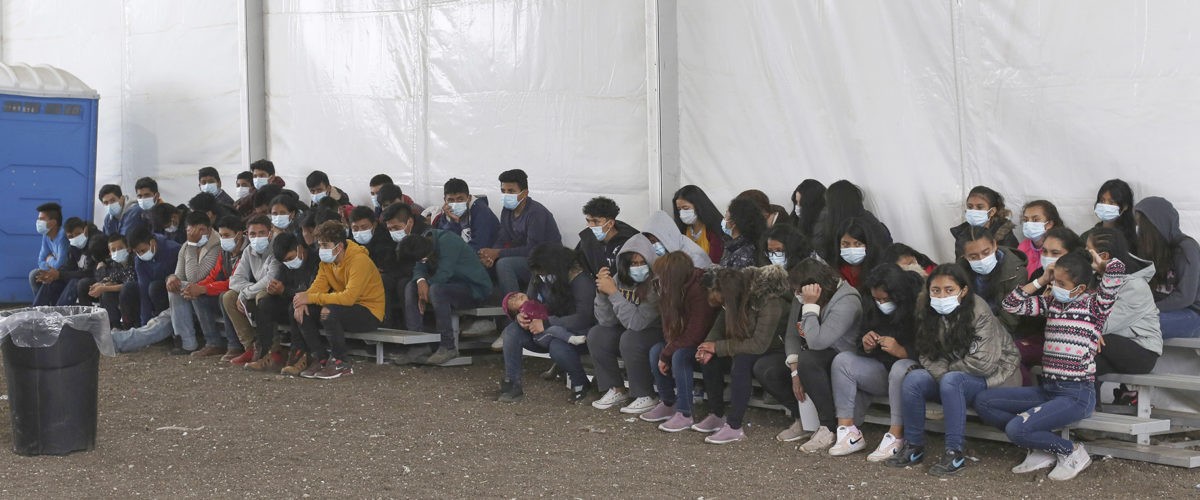Is a bipartisan solution to the nation’s broken immigration system possible? Three Texas legislators and an Arizona senator believe it is and have proposed a bipartisan bill to show how.
That bill, the Bipartisan Border Solutions Act (S. 1358), is receiving mixed reviews from immigration advocates. Some have hailed it as a compromise between the entrenched positions of Democrats and Republicans, while others see it as a wolf in sheep’s clothing.
At the heart of the criticism is distrust of U.S. Customs and Border Protection, a government entity that became more highly politicized by doing the bidding of the Trump administration in its quest to shut down almost all immigration, whether legal or illegal.
The new bill would rely heavily on CBP to manage expanded services that otherwise would be considered positive by most immigration advocates.

Jonathan Blazer
“Rather than building a fair and humane system for people fleeing danger and seeking protection, the bill instead works within the failed framework of deterrence and detention designed to short-circuit due process,” said Jonathan Blazer, director of border strategies at the American Civil Liberties Union. “While this bill includes some positive provisions, any proposal that further increases reliance on Customs and Border Protection in the asylum and detention process is a step in the wrong direction, given the agency’s record of abuse.”
The ACLU also expressed concern about provisions “that jeopardize due process for people seeking asylum, erect unnecessary barriers to releasing children to their families, and subject even more people to cruelty and danger in detention.”
On the other hand, some evangelical leaders praised the bill as a model of bipartisan opportunity.
The Evangelical Immigration Table released a statement affirming a government responsibility “to ensure secure borders” while also ensuring that “those fleeing persecution and seeking asylum in the United States should be afforded due process and treated humanely, with particular concern for the well-being of children.”
The new bill “is an encouraging step toward resolving longstanding and recurring challenges along the U.S.-Mexico border,” the group said. “No amount of partisan bickering and blame-casting will resolve the current humanitarian crisis at our border. Only a bipartisan, problem-solving approach like that used to forge this agreement will ultimately make a difference for vulnerable children, women and men, each of whom our faith teaches us is made in God’s image and worthy of respect.”
Why is this bill needed?

Danilo Zak
Danilo Zak of the National Immigration Forum wrote a detailed analysis of the bill, which was introduced in both chambers by Sens. John Cornyn (R-Texas) and Kyrsten Sinema (D-Arizona), along with Reps. Tony Gonzales (R-Texas) and Henry Cuellar (D-Texas).
While current U.S. law provides a legal right for those fleeing persecution to obtain protection and asylum status in the U.S., not everyone who arrives at the border is eligible for asylum. The application process is complicated, time-consuming and cumbersome. Critics on both sides of the aisle have acknowledged the current system is broken, but no efforts to reform U.S. immigration have been successful in years due to partisan gridlock.
“There are a number of problems with the way the U.S. asylum system currently operates, particularly for those arriving at the Southern border,” Zak wrote. “Newly arriving migrants — including unaccompanied children — are first held in Customs and Border Patrol custody, where they have limited access to legal counsel or case management services and where they often face freezing and inhumane conditions. Adults who express the desire to seek asylum are quickly interviewed to determine whether they have a ‘credible fear’ of persecution. If they fail to meet this standard, they are placed in expedited removal with only cursory access to an appeal before an immigration judge.”
For those who do make it past the initial screen, the next hurdle is a court system backlogged with 1.3 million cases.
Further, for those who do make it past the initial screen, the next hurdle is a court system backlogged with 1.3 million cases that take an average of three years to resolve. All this was made worse by the Trump administration’s refusal to fill government positions and allow due process, critics say.
And the problems get even worse during periods of heavy influx at the border, like what is happening today with a surge of migrants from Central America and of unaccompanied minors.
The Bipartisan Border Solutions Act seeks to address all this and more in comprehensive approach.
What’s in this bill?
Zak’s analysis outlines six key objectives of the legislation:
- Establish at least four “regional processing centers” in high-traffic sectors along the Southern border to better process arriving migrants and asylum seekers.
- Call for the administration to develop pilot programs over three years to both expedite asylum processing and improve asylum seekers’ access to due process.
- Reprioritize the immigration court docket during irregular migration events.
- Expand and reinforce legal orientation and access to counsel for asylum seekers.
- Fund additional personnel for various agencies involved in the asylum process.
- Establish new vetting standards for sponsors of unaccompanied children.
Each of these points has multiple subpoints underneath it, creating a compilation of things that sometimes tilt toward Democratic objectives and sometimes tilt toward Republican objectives.
On one hand, the bill offers significant concessions from the most hard-line Republican views that Cornyn and Gonzales likely are to be criticized for within their own. And on the other hand, the bill will not go far enough to satisfy the most vocal Democrats, who likely will criticize Sinema and Cuellar for selling out.
For example, a common concern among Democrats is that there aren’t enough processing points to handle the flow of immigrants coming across the border and that the facilities currently available create inhumane conditions. The bill addresses that concern by creating four new regional processing centers that would offer short-term housing and one-stop access to various offices brought together under one roof.
Concessions by Republicans would be balanced by keeping CBP in charge of the entire system, which Democrats consider the equivalent of putting the fox in charge of an improved henhouse.
Another Democratic concern is that human rights groups and legal counsel are not afforded proper contact with the asylum seekers while in custody. The bill would require access by nongovernmental organizations involved in humanitarian and legal assistance, and it would require greater access by civil liberties watchdogs.
Yet these concessions by Republicans would be balanced by keeping CBP in charge of the entire system, which Democrats consider the equivalent of putting the fox in charge of an improved henhouse.
The bill also would provide funding for increased personnel dedicated to immigration work related to the border: Adding at least 150 more immigration judges, 128 ICE attorneys and 41 support staff, at least 300 additional asylum officers, at least 300 more case management personnel under ICE, no fewer than 600 new CBP field operations officers annually, and at least 250 additional Border Patrol processing coordinators.
The question is whether these additional personnel would be tasked to make it more efficient to reject asylum seekers or to give them greater access to a fair hearing.

Jennifer Quigley
“This bill is right out of the Trump administration’s playbook. It would lead to the immediate deportation of refugees seeking protection despite their legitimate fears of persecution,” said Jennifer Quigley, senior director for government affairs at Human Rights First. “The last thing our laws should do is turn U.S. asylum assessments into rapid deportation devices aimed at deterring people from seeking refuge.”
Better legislation, she said, “should be focused on building a fair, timely and humane asylum system that welcomes people seeking refuge with dignity and preventing a future administration from rigging asylum adjudications against refugees so they are turned back to persecution and danger.”
In a different perspective, Walter Kim, president of the National Association of Evangelicals, praised the bill.

Walter Kim
“Senators Cornyn and Sinema have shown that pragmatic, bipartisan approaches to the challenges facing our nation are still possible, even in today’s polarized climate,” he said. “Their carefully crafted proposal combines workable ideas that both Republicans and Democrats can support, making the processing of asylum claims more efficient without sacrificing human rights protections. It is an important first step toward the larger, urgently needed overhaul of our broken immigration system.”
Kim was joined in his affirmation of the bill by Russell Moore, president of the Southern Baptist Convention’s Ethics and Religious Liberty Commission, and Margaret Schuler, senior vice president for international programs group at World Vision.
However, Church World Service opposes the bill, saying it “would establish an unfair asylum process at the border and create punitive barriers for those wishing to reunite unaccompanied children with loved ones.”
“Although couched in friendly terms, this bill both threatens our capacity to welcome asylum seekers and immigrants and undermines our values of compassion and welcome. Any proposal that increases reliance on Customs and Border Protection — an agency rampant with corruption and abuse — serves only to dehumanize our neighbors,” said Meredith Owen, director of policy and advocacy at Church World Service.

Meredith Owen
Likewise, the National Immigrant Justice Center said it “strongly opposes the Bipartisan Border Solutions Act” because it “resurrects harmful policies from the Trump administration that would subject asylum seekers to expedited asylum screenings that frequently result in individuals’ and families’ rapid deportations back to the conditions they fled.”
Yet the U.S. Chamber of Commerce praised the bill. U.S. Chamber Executive Vice President and Chief Policy Officer Neil Bradley explained: “The Bipartisan Border Solutions Act of 2021 would enact several commonsense measures to deal with the current influx of arrivals. These include expanding the number of border processing facilities on our southwest border, hiring additional agency personnel to increase DHS’s processing capacity, expediting the asylum adjudication process, and improving the level of care that the federal government provides unaccompanied children. These types of provisions are not only necessary to confront the ongoing crisis on our southern border, but they also need to be considered by Congress as they debate other immigration issues where reform is desperately needed.”
Related articles:
Panelists debate how to ‘normalize’ immigration after ill effects of Trumpism
What would happen if immigration policies were based on majority opinion in the U.S.?
Trump administration using obscure law to deny entry to immigrants without court process
We must not look away from 8,800 expelled immigrant children | Opinion by Elket Rodriguez
We cannot now close our border to those fleeing the horror we helped create | Opinion by Chris Conley


